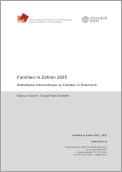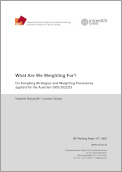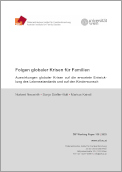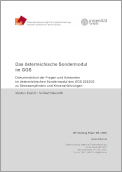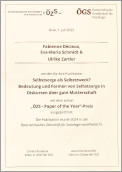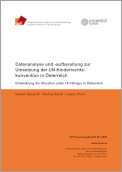Staff-child ratios in KiTas
Staff-child ratios in KiTas
The Personalausstattungsquote advances existing staff-child ratios in KiTas. It measures the degree to which staff-child ratios achieve scientific recommendation for early childhood education and care while taking age structure and other characteristics of the KiTas’ setting into account. The Personalausstattungsquote enables an evidence-based management of resources and personnel.
Publication (in German): Die Personalausstattungsquote in KiTas
Families in figures 2025
Families in figures 2025
Families in Figures (FiZ), the statistical reference work, is updated for 2025. It shows the changes in selected key figures over the past ten years. It includes data on topics such as births and fertility, marriages/registrations of registered partnerships, divorces/dissolutions of registered partnerships, household and family typs, employment, child care, family and social benefits, and European comparative data. The 71 tables and 30 figures are provided with reading examples and a glossary explains terms used in family statistics.
Familien in Zahlen 2025 (in German)
Use of elementary education in Vorarlberg
Use of elementary education in Vorarlberg
In recent years, the expansion and quality of early childhood education in Vorarlberg have made noticeable progress. Attendance rates have risen significantly and opening hours have become more compatible with the schedules of working parents. Nevertheless, there is still some reluctance in using these offerings. On behalf of the Vorarlberg Chamber of Labor (Arbeiterkammer), a qualitative interview study has been investigating why parents are unwilling or unable to make use of early education offerings.
Forschungsbericht 59 (PDF)
What are we weighting for?
What are we weighting for?
This documentation of the weighting method used for the Austrian Generations and Gender Survey (GGS) 2022/23 initially describes the standard weighting method for all countries participating in the Generations and Gender Programme (GGP). Austria identified potential biases in terms of parity, household size, and family type indicators. Therefore, additional weighting criteria for the raking method were compiled.
Working Paper 107 (PDF)
Effects of global crises on families
Effects of global crises on families
The intention to have children, expectations regarding its realization, and the timing of births depend on numerous factors. This study examines the extent to which a reduction in expected personal living standards induced by current crises may influence the intention to have children and the expected timing of the next births.
Working Paper 106 (PDF)
The special Austrian module in the GGS
The special Austrian module in the GGS
The Austrian Generations and Gender Survey 2022/23 comprises an extensive set of questions. It consists of the internationally standardized main questionnaire and a special national module. This documentation of the special module presents the items additionally surveyed in Austria. The standardized tabular presentation facilitates the comparability of the individual items.
Working Paper 105 (PDF)
Award für "ÖZS-Paper of the Year"
Award für "ÖZS-Paper of the Year"
A prize for the “ÖZS-Paper of the Year” was awarded at this year's Congress of the Austrian Society for Sociology which took place from 30.6.-2.7.2025 in Graz under the title "The Climate of Society". Eva-Maria Schmidt from the ÖIF received this award together with Fabienne Décieux and Ulrike Zartler for the text "Selbstsorge als Selbstzweck? Meaning and forms of self-care in discourses on good motherhood".
Publication (in German)
UN-Convention on the Rights of the Child – Implementation in Austria
UN-Convention on the Rights of the Child – Implementation in Austria
The United Nations Convention on the Rights of the Child has a high priority in Austria. The individual provisions, including explanations, can be viewed at https://www.kinderrechte.gv.at. Individual regulations have also been incorporated into the Austrian Federal Constitution. This research report traces the development of the implementation of the provisions of the Convention on the Rights of the Child in Austria by presenting relevant statistical time series for each article.
Forschungsbericht 58 (in German)


